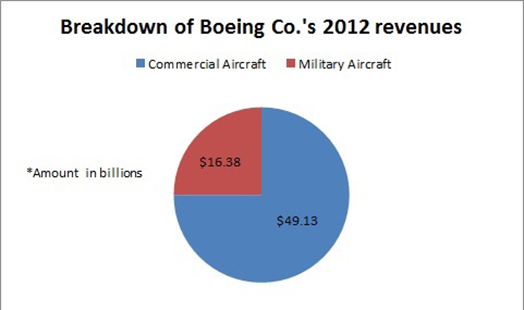
Military aircrafts counted for 25 percent of Boeing Co.’s 2012 total aircraft sales.
Ashley Lapin/MEDILL
(ARTICLE ORIGINALLY PUBLISHED FEB. 28, 2013 ON MEDILL REPORTS CHICAGO)
With the March 1 deadline just a day away, President Obama has summoned House and Senate leaders to the White House Friday for a final meeting to discuss how to avoid the $85 billion in budget cuts that will go into effect at midnight.
However, the outlook for a compromise is not promising as both sides appear to be resigned about what is to come.
Some experts are downplaying the immediate effects.
“A lot of people won’t notice it at all,” says Mark Rom, associate professor in the American Government department at Georgetown University. “The people who are directly affected will be affected dramatically, but if you’re not directly affected you may not even notice.”
Some of those who are going to be affected dramatically by the sequester are defense contractors, such as Boeing Co. Some $40 billion to $45 billion of the cuts will be targeted at defense spending.
But Boeing executives maintain that it’s business as usual for now.
“It is too early to speculate on what deep defense budget cuts might mean for individual programs or the facilities that support them,” said Boeing representative Karen Fincutter. “That said, Boeing has been anticipating declining U.S. defense budgets for several years and we have been making the changes necessary to compete and grow in this environment.”
Dennis Muilenburg, CEO and president of Boeing’s Defense unit, said at an industry conference that the company is hopeful that modifications to the sequester can still be made. “Boeing’s own worst-case scenario would reflect between $100 billion and $300 billion in Pentagon cuts” over the five-year sequestration period, the Wall Street Journal reported.
Multiyear government contracts already in place with defense contractors such as Boeing are likely to cushion the blow.
Such contracts are common between defense contractors and the U.S. government. Many of Boeing’s defense contracts have a duration of four years and ensure stable funding and services over that time period. In turn for that security, the company provides its services and products at a lower cost.
Currently, Boeing has several multiyear procurement contracts and fixed-price contracts with the government. Teal Group Corp. analyst Richard Aboulafia said this will pose an interesting situation for the government.
Legally, the contracts ensure the same level of funding for the rest of the contract period. However, the sequester cuts this “guaranteed” funding significantly. According to Aboulafia, Boeing could bring suit against the government if the contracts are not fulfilled.
The irony of that is not lost on Aboulafia.
“The whole point of setting up these contracts is to avoid uncertainty,” Aboulafia said. “However, the government is facing uncertainty with more uncertainty.”





